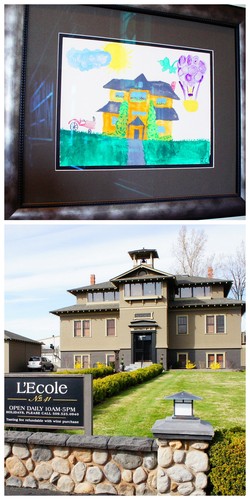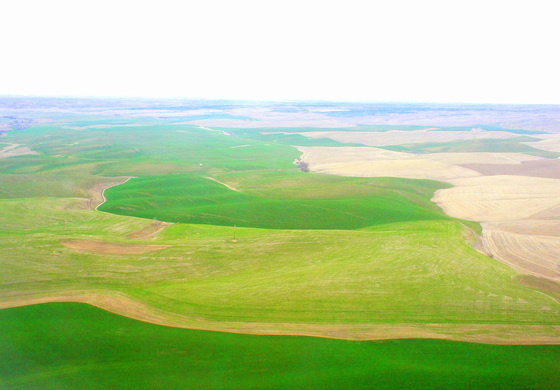WALLA WALLA--French fur traders settled these gently rolling eastern Washington hills 150 years ago, in the region we now call the Palouse. Was it named for the grassland, waving in the breeze like a vast lawn? (In French, your lawn is la pelouse.) Or for a native tribe, called Palus?
Another tribe, the Walla Walla, lived along the river, and gave their name to the settlement itself. As for the Palouse, it's made up of silt dunes from the Missoula floods covered in wind-blown loess, prime agricultural land, whose rich, black soil is planted with perennial grasses (wheat), root vegetables (sweet onions) and, increasingly, vitis vinifera (wine grapes). Some 2,000 acres of grapes at last count, growing next to fruit orchards and wheat fields, and over 100 wineries. The valley formed by the Walla Walla river also includes a unique alluvial fan of cobbles, some 250 acres of which have been planted, championed by a Frenchman, Christophe Baron, who says it's just like the galets of Châteauneuf-du-Pape. One of the state's pre-eminent geologists, Dr. Kevin Pogue, agrees, and has filed an application to create "The Rocks of Milton Freewater" as a sub-AVA of the Walla Walla Valley.
This represents a new maturity for a wine-growing region that, 30 years ago, didn't even exist.
 Gary Figgins, as much as anyone, is the father and godfather, craftsman, role model and mentor of Walla Walla's wine community. It started with a windowsill crop of concord grapes at the apartment he shared with his bride, Nancy shortly after they married (the wine was "cloudy and undrinkable" he told me two decades ago) and grew from there into an obsession. Leonetti is his mother's maiden name. "Figgins didn't sound very romantic," he opined 20 years ago.
Gary Figgins, as much as anyone, is the father and godfather, craftsman, role model and mentor of Walla Walla's wine community. It started with a windowsill crop of concord grapes at the apartment he shared with his bride, Nancy shortly after they married (the wine was "cloudy and undrinkable" he told me two decades ago) and grew from there into an obsession. Leonetti is his mother's maiden name. "Figgins didn't sound very romantic," he opined 20 years ago.
After Figgins came Rick and Darcy Small's Woodward Canyon Winery, then Baker and Jean Ferguson's L'Ecole No. 41. Twenty years ago, there were still only six or seven bonded wineries, and not much acreage. Then the vines planted by Jim McClennan (Seven Hills) and Norm McKibben (Pepper Bridge) started coming online. Walla Walla Community College launched a program in viticulture and enology. The Walla Walla Valley Wine Alliance was formed. And in the space of a generation, Walla Walla went from an awkward joke ("the town they named twice") to official recognition as an American Viticultural Area and critical acclaim as one of the best growing regions in the country, especially for cabernet sauvignon. When they drew the AVA boundaries in 1984, the mapmakers included the Oregon side of the valley. At the time, it was the first bi-state AVA, but its ecumenical character probably hampered its marketing.
On the Washington side, Burgundian distinctions are evident: the wine can smell like violets one one side of the road, like kid gloves on the other. For example, Pepper Bridge Vineyard, planted on ice-age deposits, has spicy, forward fruit and aggressive tannins. Seven Hills Vineyard, planted on rich, wind-blown aloessial soil, produces elegant, balanced wines with black fruit and tobacco overtones.
Over two dozen wineries occupy space at Walla Walla's airport, a regional facility that housed 10,000 military personnel during World War II. The Port of Walla Walla converted the airfield's military buildings (barracks, mess halls, fire stations) into space for start-up businesses. Another 20 wineries have tasting rooms, if not full production facilities, in downtown Walla Walla. Wine festivals have become the community's biggest tourist attraction.
The face of the Palouse has changed. Gary Figgins has passed the torch to his son. Rick Small has hired help (and has welcomed the return of his daughter, Jordan, to the family business). The Ferguson's son-in-law, Marty Clubb, runs things at the old Lowden Schoolhouse. Grain silos still stand as silent sentinels on the land, but the riches of the Walla Walla are increasingly found in the cellars of its wineries. And just last month, Clubb, who graduated from Texas A&M, learned that two of the Walla Walla wines he had entered in the Dallas Morning News wine competition had won gold medals.
My trip to Walla Walla was sponsored by the Walla Walla Wine Alliance.

Leave a comment